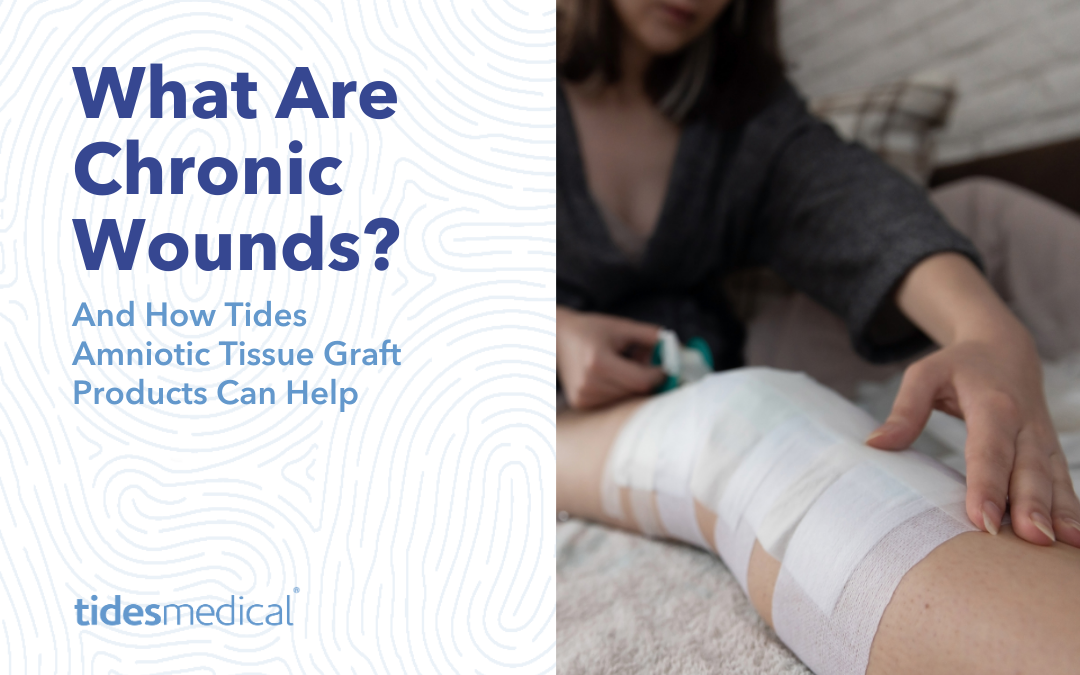Tides Amniotic Tissue Graft Products are incredibly versatile and excellent options for patients who experience chronic wounds. But what are chronic wounds? And how do they differ from acute wounds? The purpose of this post is to discuss these differences and how Tides amniotic tissue graft products can help. This post will answer the three questions below:
- What are chronic wounds?
- How do chronic wounds differ from acute wounds?
- How can Tides Amniotic Tissue Graft Products help with chronic wounds?
What are Chronic Wounds?
Chronic wounds are wounds that do not heal in an orderly and timely manner. If a wound has not healed in three or more months, shows little to no signs of healing, or recurs frequently, it is considered a chronic wound. Chronic wounds are often a result of an underlying medical condition or complication that hinders the body’s natural healing process. Chronic wounds can increase the risk of infection and significantly impact quality of life.
Common types of chronic wounds include:
- Pressure ulcers (Bedsores): These develop due to prolonged pressure on a particular area of the body, often in individuals with limited mobility. They are frequently seen in nursing home residents or individuals who are bedridden.
- Diabetic foot ulcers: People with diabetes are at a higher risk of developing foot ulcers due to poor circulation and nerve damage. These ulcers can be particularly problematic because of the reduced sensation in the feet, making them prone to injury and infection. For more information on Diabetic Foot Ulcers, view this previous post: “Diabetic Foot Ulcers – What you Need To Know”.
- Venous ulcers: These occur in the lower leg and are usually associated with chronic venous insufficiency. This condition impairs blood flow back to the heart, leading to the pooling of blood in the legs and the development of ulcers.
- Arterial ulcers: Arterial ulcers are caused by poor blood circulation, often due to atherosclerosis or peripheral artery disease. Reduced blood flow limits the delivery of oxygen and nutrients to tissues, preventing proper wound healing.
- Neuropathic ulcers: Individuals with conditions like peripheral neuropathy (nerve damage) are prone to developing neuropathic ulcers. These ulcers result from a lack of sensation, so the person may not realize when they have sustained an injury.
- Surgical wounds: Some surgical wounds can become chronic if they do not heal or if there are complications such as infection or poor wound care.
What is the Difference between Chronic and Acute Wounds?
Chronic wounds and acute wounds are two distinct categories of wounds, primarily differentiated by their underlying causes, characteristics, and healing processes. Here are some of the key differences between chronic and acute wounds:
- Underlying Cause: Acute wounds often result from a sudden, well-defined cause of injury or trauma to the skin and underlying tissues. This can include cuts, burns, surgical incisions, etc. Chronic wounds typically result from an underlying medical condition. They develop gradually and persist over an extended period.
- Healing Time: Acute wounds generally follow a predictable and timely healing process, while chronic wounds do not progress through the normal stages of healing if they heal at all.
- Characteristics: Acute wounds are characterized by a clear and well-defined wound bed with clean and viable tissue and exhibit signs of normal wound healing processes. Chronic wounds often feature non-viable tissue, infection, and an irregular wound bed.
How can amniotic tissue graft products help with chronic wounds?
Tides Medical amniotic tissue graft products can play a valuable role in the management and treatment of chronic wounds.
While amniotic tissue graft products can be beneficial in managing chronic wounds, they are often used as part of a comprehensive wound care plan. This may include debridement, infection control, optimization of underlying medical conditions, and other therapies tailored to the patient’s unique circumstances. Healthcare professionals should assess each case individually to determine the most appropriate treatment approach.
Tides Medical is an amniotic tissue graft company and we would love to share more information – learn about Tides Medical and contact us today.



 Marc Stemler, Ph.D.,
Marc Stemler, Ph.D.,  Mora Melican, Ph.D., VP of Operations, Research & Development
Mora Melican, Ph.D., VP of Operations, Research & Development LESA CATALON,
LESA CATALON, DAVID CASTILLE,
DAVID CASTILLE,




 Dr. Thomas E. Serena MD FACS FACHM MAPWCA
Dr. Thomas E. Serena MD FACS FACHM MAPWCA JOSH WILLETT,
JOSH WILLETT, JEFF MONTGOMERY,
JEFF MONTGOMERY, MIKE RIDDLE,
MIKE RIDDLE, BENJAMIN KIMBALL,
BENJAMIN KIMBALL, DOUG PAYNE,
DOUG PAYNE, JOE SPELL,
CEO
JOE SPELL,
CEO


